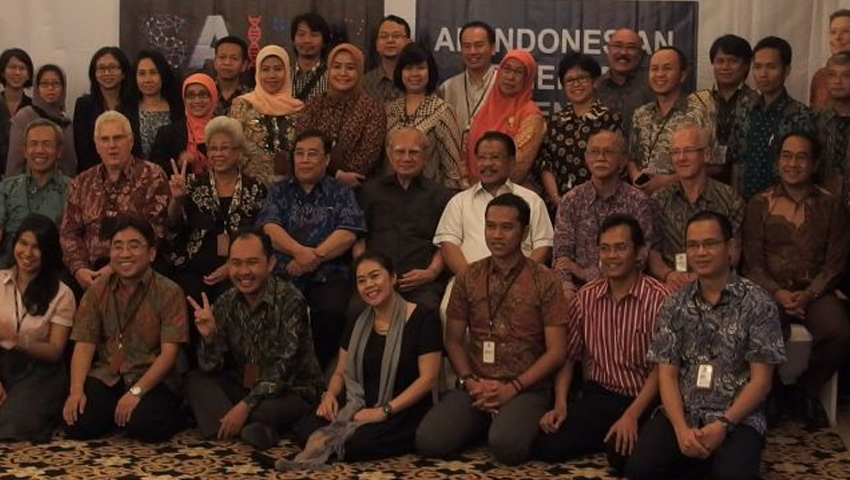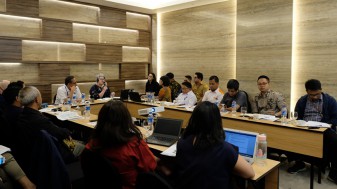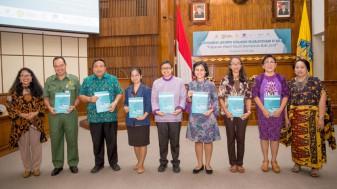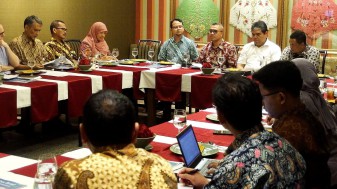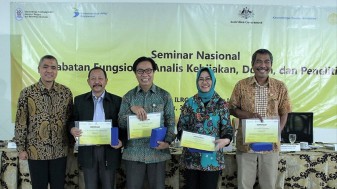Opening Remarks by Fred Carden, KSI Lead Technical Advisor, at the Young Academy and Young Scientists Network in the Indonesian Academy of Sciences (AIPI) Silver Jubilee, May 26.
Thank you for the opportunity to speak to you. It is a privilege to speak to such an influential group of young scientists, young scientists who care deeply about their country and about the contribution that science can make to its development.
Let me start by mentioning the Knowledge Sector Initiative very briefly. KSI is a partnership between the Governments of Indonesia and Australia with a mandate to strengthen the use of evidence in public policy. We do that in a number of ways, but one way is to strengthen the institutions that underpin science and research. Towards that part of our mandate, the Academy of Sciences is foundational.
By way of background, I am a social scientist. I spent the first decade of this century looking at how research has had an influence on public policy, so my remarks today are based on what I learned in that review. The importance of context cannot be over emphasized, both from the point of view of the nature of demand for evidence and the capacity in the policy community to use evidence. Culture and geography matter, especially in Indonesia. The ability to communicate effectively to policy makers, journalists, advocates, and communities is key. If the evidence stays hidden in the scientific literature, it is unlikely to have an influence no matter how important the evidence. The ability to network and bring other scientists as well as other interested communities to the research you are doing adds significant value: few problems can be solved by one specialist and one discipline alone. Finally what we found was a much needed new skill for the scientific community, that is, the ability to think about the institutional and organisational infrastructure that is needed to support the use of evidence in public policy. So let me put this in context of the Young Academy as I see it.
According to the Royal Society report on Indonesia, in their Atlas of Islamic World Science, while Indonesia is not lacking in scientific ambition, decades of neglect have left its infrastructure still too weak to build a robust R&D system.
As we have heard and as we read in reports such as this, you are in need of a much stronger science community to transition to a knowledge economy and avoid the middle income trap. As the Young Academy, yours is a critical role in achieving that shift.
Right now, there are very few Indonesian contributors to peer reviewed journals, much lower than your neighbours and peers in Malaysia, Singapore, South Korea and Thailand. Few patents are registered in Indonesia compared to other countries, and of those, many are registered by foreign entities that happen to be based in Indonesia. This is simply not good enough. On the other dimension of science, its influence on public policy – the social use of science – this is also weak. Most of the evidence for public policy advice comes through the World Bank and other international institutions and consultancies, not from Indonesian universities, research centres and think tanks. This too is unacceptable.
The Academy has taken a major step towards correcting this situation in promoting a Young Academy because as the next generation of scientific leaders in Indonesia, you have critical roles to play on both these dimensions of building the role of science in national development – building the science itself as well as its use for national development. They are giving you a golden opportunity for influence and I hope you can grab it full force. Your challenge in my view, is to help build a knowledge economy in Indonesia through building a strong network for science, not just for your own work, so that you can build science as a whole and strengthen opportunities for those with less influence than you have. The Science Agenda 2045 which you have worked on together and which will be launched this afternoon is an exciting development in this regard.
And I would make a special plea for the social sciences in this development. In the end it is people, and their organisations and institutions that use evidence and findings from science for development, so deepening our understanding of how these organisations and institutions work, and how decisions are made, must proceed in parallel with scientific discovery.
Here I want to propose five challenges for the Young Academy - there are no doubt others, but these are five I see as critical to seeking answers to the 45 big questions you pose:
1. Strengthen critical thinking in your students.
A questioning mind and academic debate are essential skills for researchers. Your students need your encouragement and a supportive environment in which to build those skills, not only learn the technologies and theories. Teach them to ask questions no one can yet answer, to debate with you and their fellow students. Critical thinking will help them begin to build their own theories that they can apply in the Indonesian context.
2. Build scientific research into the University culture.
The University in Indonesia does maintain the tridharma of teaching, research, and service in principle. But in practice teaching wins every time. Scientific research is not prioritized in the University, and as a result, adequate time and resources are not supported. There are many elements to this and there are some studies going on now about this. Both KSI and CIPG have ongoing studies as does AIPI itself. We heard in the opening plenary about the Academy’s interest in a consensus report on research in the Indonesian university. Your promotion of scientific research as a central university value and function, and your involvement in these efforts by AIPI, KSI and CIPG, and supporting their diffusion and debate would be welcome.
3. Advocate for change in the rules to make the university more research friendly.
The cultural change just suggested is necessary but that needs to be backed up and supported with new rules and procedures that value research and scientists. Autonomy is coming to some universities and so they have the possibility to try new systems and approaches and to promote University culture change. Even if your university is not one of these, encourage the autonomous universities to try some things you think you would like to see in your own university. (We are all in this together so we need to pull together as universities to promote change.)
4. Science Diplomacy: Demonstrate to the nation why research is a noble profession and why Indonesia needs to generate home grown scientists to build a knowledge economy.
Promote stories of how science has helped - in economic development, or in social development - education or health. Science translates plants into medicine, science builds our capacity to mitigate and adapt to climate change - are there some stories about using science to the benefit of Indonesia that should be told? Make these stories known in simple clear language, through social media, through op eds in newspapers, through interviews, presentations, articles and so on. Know who has influence – on public opinion as well as political opinion. For example, a few people are tweeting about the Jubilee –retweet and use it as an opportunity to promote the value of science to the community.
Just doing good science is not enough any more. You have to promote it and demonstrate its value to society.
5. Push and support the Academy to fulfill its role as science advisor to the nation so it is putting maximum effort into this goal.
Push the Academy to action. Get the Academy into the President's office pushing for change. Help it generate public interest and understanding, be regional ambassadors for science. Use your position as members of the Young Academy to promote science as central to the knowledge economy that the country needs to avoid the middle income trap.
Indonesia – and you – face many challenges. But the same Royal Society report I quoted earlier maintains optimism and concludes that,
Indonesia's scientific system has a great many strengths but also some fundamental weaknesses. The flaws are not fatal, however, and if addressed soon, and with genuine commitment, the country could start to change its scientific fortunes.
You are the ones who can make that happen.
We all look forward to hearing more about the Science Agenda 2045 today, but also watching for its influence over the coming years.
Thank you.

